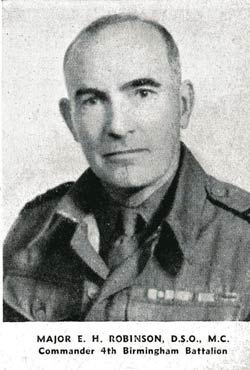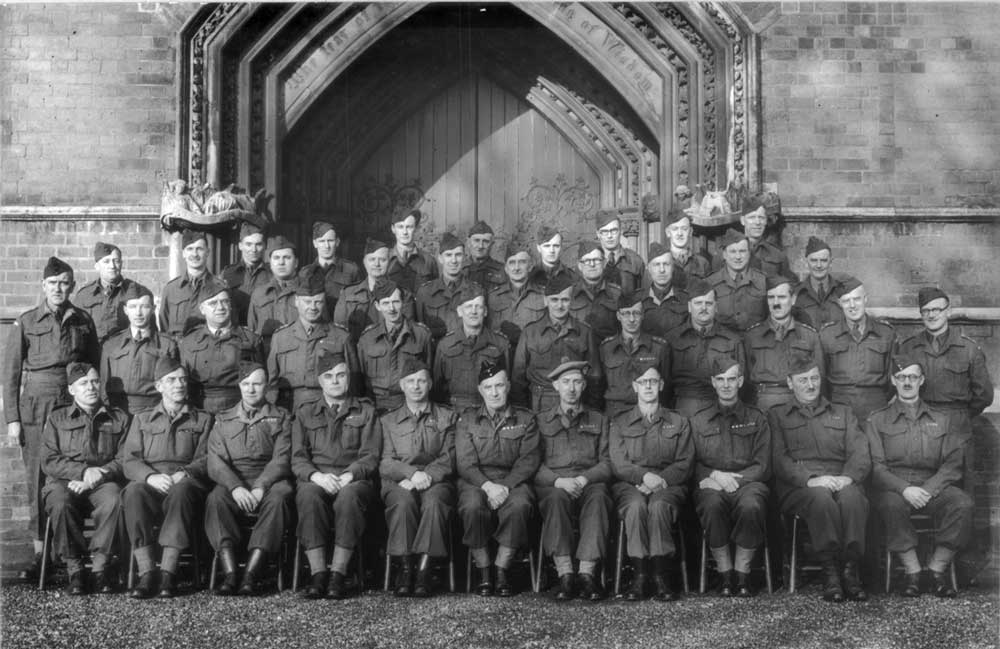This is a page within the www.staffshomeguard.co.uk website. To see full contents, go to SITE MAP.
HOME GUARD MEMORIES AND INFORMATION - WARWICKSHIRE
4th BIRMINGHAM
BATTALION, BRIGADE or SECTOR
and
Lt.-Col. E. H. ROBINSON, D.S.O., M.C.
|
 The
4th
Birmingham Battalion was one of
the initial ten Home
Guard battalions established in Birmingham in June
1940. It was commanded by
Major (later
Lt.-Col.) E.H. Robinson D.S.O., M.C. (1890-1968). Later in
1940 it was superseded by one or more of the new
Battalions which were established at that time, in
particular the 24th Warwickshire (Birmingham)
Battalion which Lt.-Col. Robinson commanded for
a further period. Later in the war the
Battalion C.O. was
Lt.-Col. H. H. Little,
M.C. The
4th
Birmingham Battalion was one of
the initial ten Home
Guard battalions established in Birmingham in June
1940. It was commanded by
Major (later
Lt.-Col.) E.H. Robinson D.S.O., M.C. (1890-1968). Later in
1940 it was superseded by one or more of the new
Battalions which were established at that time, in
particular the 24th Warwickshire (Birmingham)
Battalion which Lt.-Col. Robinson commanded for
a further period. Later in the war the
Battalion C.O. was
Lt.-Col. H. H. Little,
M.C.
During
that time Lt.-Col. Robinson was Headmaster of
Moseley Grammar School. His
record in the Great War was remarkable. As an officer in the
King's Shropshire Light Infantry he was
wounded on several occasions and was highly
decorated: he was awarded the D.S.O. with a later
bar; and the M. C., again with a bar. His war record
is admirably described in detail within the website
of the Old Moseleians Association, and the article
can be accessed
here.
The above
article contains an image which is entitled "The 4th
Birmingham Brigade" and a higher definition version
of it is shown below, with a caption giving full
names of all present.
The original caption has been supplemented by
further information about the rank and Battalion
affiliation of those officers whose names appear in the
Home Guard Western Command List of February 1941. That
information appears in brackets after each name.
|
 |
Moseley Grammar School
Names from the Left
(including 1941 rank and affiliation in
brackets, where applicable)
BACK ROW
2/Lt HT Brockhurst, 2/Lt JRC Goodwin, 2/Lt DW
Spafford, Capt. CR Boyson, 2/Lt RA Soanes, 2/Lt LJ
Tracey, 2/Lt WJ Flattery, 2/Lt CJ Sharpe
THIRD
ROW
Lt E Wood, Lt KV Perks, Lt KR Frazier, Lt
HHW Smith, Lt RH Roberts, Lt WL Mackie, Lt C King,
Lt GE Smith, Lt CC Spiers, 2/Lt E Williams
SECOND ROW
Capt WE Fletcher (24th Warks),
Capt JJ Merrick (42nd Warks), Capt JDF
Findlay (24th Warks) , Capt RM Beck
(Lt 24th Warks) , Capt RWS Mackay (2/Lt
42nd Warks), Capt JW Gillespie (2/Lt 24th
Warks), Capt DF Price, Capt EM Spafford
(2/Lt 24th Warks),
Capt RR Eldridge, Capt
HH Verralls, Capt HV Wollaston, Capt LE Bayliss
FRONT ROW
Lt Col RS Smith (Lt 38th Warks)
, Lt Col JS Irving (CO 38th Warks), Maj
EH Harris, Maj EV Hardaker MC (Capt 24th
Warks), Lt Col CH Hill (Major 24th Warks),
Col EH Robinson, DSO, MC (Lt Col CO 24th
Warks), Maj W McLean (Cameronians) ,
Maj
WH Veal (Lt 24th Warks), Maj JH Crosskey
MC (MO 24th Warks), Lt Col AV Parsons
(Capt 24th Warks), Maj AW Evans (Capt
25th Warks)
Further information
Capt. J. W. Gillespie
(second row) was an ex-army PT instructor and a PE
Master at Moseley until about 1957 or 58.
Col.
E. H. Robinson (front row) was Headmaster of
Moseley G.S.
Lt. Col. C H Hill to his right
may or may not be the Charlie Hill who taught
maths at the school for many years after the war.
|
|
Webmaster's
note
There are difficulties in the interpretation
of this image, possibly associated with the fact that the
caption was in all probability not contemporary
but applied at a much later date. These have not
yet been satisfactorily resolved. There are
various possibilities:
1.
The image DOES
show the 4th Birmingham Brigade in 1940 (or, more
correctly, the 4th Birmingham Battalion).
In the
middle of the picture is Lt.-Col. Robinson, C.O.
of that Battalion. Several of the senior officers
present are known to be members (often with a much
reduced rank) of other Battalions which evolved
from the 4th some time before February 1941.
Nobody seems to be wearing Battalion insignia. The
number of officers is about right for a Battalion.
BUT
- expert opinion is that the uniform of at
least one officer dates from post-June 1942; and
the lack of service chevrons on the right wrist
suggests a date earlier than February 1944.
- none of
the less junior officers in the rear two rows
features in the 1941 Officers list for Western
Command. Some may have joined Home Guard units in
different parts of the country but it would be
astonishing that none of them served in the
Midlands area.
2. The image shows a
1940 gathering of both Home Guard and Army
officers, perhaps with an association with Moseley
Grammar School in common.
This explains the lack of Home Guard involvement
of many of the men shown.
BUT
- the junior
officers cover a wide range of ages -- not just
newly commissioned young men. There are even Great
War veterans amongst them. The latter are unlikely
to have been serving Army officers; but why do
they not appear in 1941 HG records?
- how have
such a large number of serving Army officers been assembled in one
place in the second half of 1940?
3. As 2
above but at a later date, either in 1943/4 or even
post-war.
This might explain the lack of a 1941 HG
involvement as officers for many of the men - they
may have been commissioned later; and,
if post-war, the lack of insignia. It might also
explain the discrepancy between the stated rank on
the caption for some, and the official rank in
1941, the caption thus showing the rank ultimately
achieved.
BUT
- if the image dates from the
war years, before the standdown of the Home
Guard: why the lack of Battalion insignia on men
known to have been attached to specific Midlands
HG Battalions? And, again, how could such a large number of
serving Army
officers have been assembled in 1943 or 1944?
-
if post-war, what would the incentive have been
and what was the occasion for the assembly of so
many officers?
Update January 2019
In 1944, the
organisation of the Western Command Home Guard (of
which the Warwickshire battalions were a part)
involved the grouping of these battalions into
Garrisons and then further into Sectors. Within
the Birmingham Garrison there were six such
Sectors of which F4 Sector comprised the 24th,
38th, 40th, 42nd and 51st Warwickshire Battalions.
It may well be,
therefore that this group represented, in one way
or another, F4 Sector, Birmingham Garrison of late
1944 and was described as the "4th
Birmingham Brigade". Such a unit would have been
commanded by a full Colonel and according to the
caption this is the rank that Lt.-Col. Robinson
held at the time of the photograph. Many questions
however remain unanswered including the very size
of the group and the appearance of so many faces
who, in Home Guard terms, were unknown in 1941. |
|
ACKNOWLEDGEMENTS
Grateful acknowledgement is
made to
the Old Moselians Association; to Mr.
Keith Townsend through whose good offices this
information became available to staffshomeguard; and
to Austin Ruddy for information on uniforms.
Image and information © Old
Moselians Association 2015
|
|
x116
March 2015, updated January 2019 |
|
|